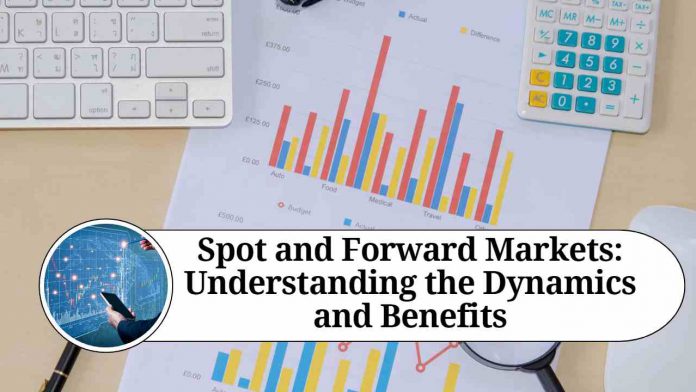Introduction
In the realm of financial markets, spot and forward markets play crucial roles in facilitating the trading of various assets, such as commodities, currencies, and financial instruments. These markets serve distinct purposes and offer different advantages to market participants. In this blog, we will delve into the spot and forward markets, explore their characteristics, and highlight the benefits they offer to investors and businesses.
Spot Market: Immediate Transactions
The spot market refers to the market where financial instruments, commodities, or currencies are traded for immediate delivery and settlement. In simple terms, it involves the buying and selling of assets “on the spot.” In this market, transactions are settled on the spot or within a short period, typically within two business days.
Characteristics of the Spot Market
- Immediate Settlement: One of the key characteristics of the spot market is immediate settlement. Buyers and sellers exchange the asset and the corresponding payment almost instantly, ensuring prompt delivery.
- Current Market Price: The spot market allows participants to trade assets at the prevailing market price. Prices in the spot market are influenced by factors such as supply and demand dynamics, market sentiment, and economic indicators.
- Transparency: Spot market transactions are generally transparent, as market participants can observe the current market price and execute trades accordingly. This transparency enhances market efficiency and fosters fair pricing.
Benefits of the Spot Market
- Quick Liquidity: The spot market provides quick liquidity, allowing investors and businesses to convert their assets into cash promptly. It offers an avenue to sell assets without the need for long-term commitments or contracts.
- Price Discovery: As the spot market reflects the current market price, it serves as a reliable source for price discovery. Market participants can use spot prices as a benchmark to determine the value of assets and make informed investment decisions.
- Hedging Opportunities: Spot markets enable participants to hedge against price fluctuations and mitigate risks. For example, commodity producers can sell their products in the spot market to secure a fixed price, protecting themselves from potential price declines.
Forward Market: Future Contracts
The forward market, also known as the forward exchange market, involves the trading of assets with delivery and settlement at a future date. In this market, participants enter into forward contracts, which are customized agreements between two parties to buy or sell an asset at an agreed-upon price and future date. Other Related Blogs: Sinking Fund Depreciation
Characteristics of the Forward Market
- Future Delivery: The primary characteristic of the forward market is that it facilitates future delivery and settlement of assets. Participants agree on the terms of the contract, including the price, quantity, and delivery date, providing certainty and reducing uncertainty.
- Customization: Forward contracts are highly customizable, allowing participants to tailor the terms to their specific needs. This flexibility enables businesses to manage risks effectively and adapt to their unique circumstances.
- Lack of Standardization: Unlike standardized contracts traded on exchanges, forward contracts are privately negotiated between parties. As a result, terms and conditions may vary, making forward contracts less liquid and less accessible to small investors.
Benefits of the Forward Market
- Risk Management: The forward market provides a platform for risk management, allowing participants to hedge against potential price fluctuations. For instance, importers can use forward contracts to lock in favorable exchange rates, protecting themselves from currency volatility.
- Price Stability: Forward contracts enable businesses to secure future prices, providing stability and predictability in their operations. This stability allows for better planning, budgeting, and financial decision-making.
- Tailored Solutions: The customizable nature of forward contracts allows participants to design solutions that suit their specific requirements. This flexibility enhances efficiency and enables participants to address their unique risks and objectives.
Conclusion
Spot and forward markets are essential components of the financial landscape, serving distinct purposes and offering various benefits
Frequently Asked Questions (FAQs)
Q1: What is the main difference between spot and forward markets?
A: The main difference lies in the timing of the transaction and delivery. Spot markets involve immediate transactions and delivery, where assets are bought or sold “on the spot.” In contrast, forward markets facilitate the trading of assets with delivery and settlement at a future date, based on pre-agreed terms.
Q2: How does the spot market determine prices?
A: Spot market prices are determined by the forces of supply and demand. Market participants, including buyers and sellers, contribute to the price discovery process by executing trades based on their willingness to buy or sell at a given price. The interplay of these forces establishes the current market price.
Q3: What are some examples of assets traded in the spot market?
A: The spot market facilitates the trading of various assets, including commodities (such as oil, gold, and agricultural products), currencies, stocks, bonds, and other financial instruments. Additionally, spot markets exist for electricity, natural gas, and other energy commodities.
Q4: What are the benefits of participating in the spot market?
A: The spot market offers several advantages, including quick liquidity, transparent pricing, and the opportunity for price discovery. It allows investors and businesses to convert assets into cash promptly, provides a benchmark for determining asset values, and enables hedging against price fluctuations.
Q5: How do forward contracts work in the forward market?
A: In the forward market, participants enter into forward contracts, which are customized agreements between two parties to buy or sell an asset at a future date and predetermined price. These contracts allow participants to manage risks, secure future prices, and tailor terms to their specific needs.
Q6: Can you provide examples of using forward contracts in the real world?
A: Forward contracts are widely used in various industries. For instance, importers and exporters often use forward contracts to hedge against currency fluctuations. Commodity producers and consumers utilize forward contracts to lock in future prices, ensuring stability and managing price risks.
Q7: Are forward contracts standardized?
A: Unlike standardized contracts traded on exchanges, forward contracts are privately negotiated agreements. They can be customized to meet the specific requirements of the parties involved. However, this lack of standardization may limit liquidity and accessibility, particularly for small investors.
Q8: How do spot and forward markets complement each other?
A: Spot and forward markets serve different purposes but are interconnected. Spot markets provide immediate liquidity, transparency, and price discovery, while forward markets allow participants to manage future price risks and secure prices over a longer time horizon. Together, they facilitate efficient asset trading and risk management.
Q9: Are spot and forward markets regulated?
A: Regulations governing spot and forward markets vary across jurisdictions. In many countries, spot markets are subject to financial regulations and oversight by regulatory bodies. Forward markets may also be subject to regulations, particularly if they involve financial derivatives or currencies.
Q10: Can individuals and small investors participate in spot and forward markets?
A: Both spot and forward markets are accessible to a wide range of participants, including individuals and small investors. Spot markets are generally more accessible, as they involve immediate transactions at prevailing market prices. However, participation in the forward market may require specialized knowledge or the involvement of intermediaries, such as futures brokers or financial institutions.




















